Thank you for giving
Belgian Red Cross-Flanders continuously collects blood, plasma and platelets. We can only do this thanks to the voluntary and selfless efforts of our donors.
By 2024, our 183,469 donors accounted for some:
- 228,624 blood donations
- 162,096 plasma donations
- 16,670 platelet donations
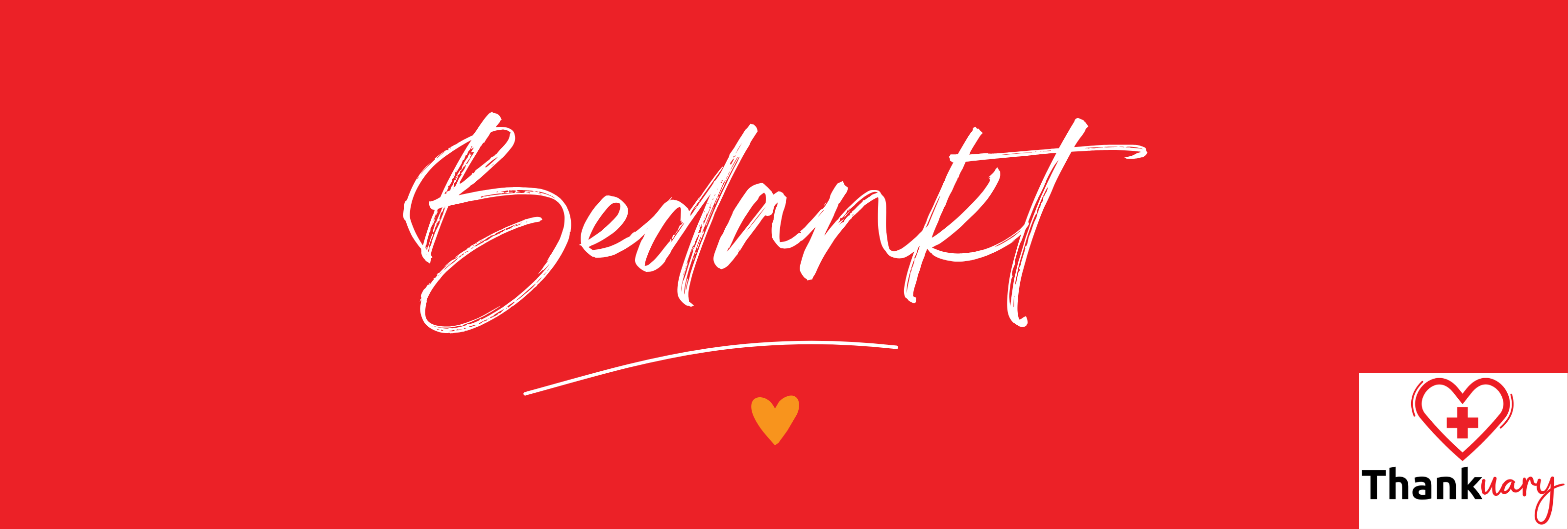
A lot of seriously ill people need a blood product (red blood cells, blood plasma, platelets or stem cells) to survive. This is how you help with:
- A blood donation patients suffering from anemia
- a plasma donation newborn babies with severe jaundice
- a platelet donation people undergoing radiation or chemo
So just like that, you can save the life of someone close to you! Just by donating.
Discover below stories from patients and donors about how blood or plasma has changed their lives - and the lives of their loved ones.
Thanks for giving for...
Daniel gives for all who need it
Daniel, 73 and a passionate plasma donor, proudly recounts his long history as a donor. "I regularly donate plasma at the donor center in Bruges," he begins. "I'm healthy, so why shouldn't I do it? People who need help, people who are sick - them I want to help."
Daniel began donating back in the 1970s, when the Red Cross started plasma donations. "I went to the donor center after work," he recalls. Now that he is retired, he easily schedules his donations. "I have plenty of time, and it's so easy to give plasma."
When asked how many lives he has already saved, he had no idea. "I really wouldn't know," he admits. The answer - 1,344 lives - leaves him silent for a moment. "Pfieuw, spectacular," he responds with a chuckle.
Daniel ends his story with an appeal, "People, please, donate plasma en masse. Go to the donor center near you. It's such a simple way to make a big difference."
Kris gives for his wife Sandie
Kris and Sandie know better than anyone how important blood donations are. "I donate blood for my wife, Sandie," Kris begins his story.
26 years ago, during the birth of their oldest daughter, things unexpectedly went wrong. "We didn't know that because of my pregnancy, the clotting from my blood stopped," Sandie says. "Because my blood just didn't clot, I started bleeding heavily after giving birth."
It was a life-threatening situation in which Sandie needed a lot of blood to survive. "That was incredibly intense," she recalls. "It made us realize how important it is for people to donate blood. And my husband does it now so other people in similar situations can be helped."
The experience changed their outlook on blood donation forever. "After my wife needed blood, I started donating," Kris says. Since then, giving blood has become a family habit: "As soon as our daughter turned 18, she started giving blood, too."
Kris, Sandie and their daughter realize that giving blood, is more than giving half an hour of time - it is a way of giving others a second chance, just as Sandie was given. "We realize every time how valuable a donation can be," Kris concludes.
Tomas and Diewer give for baby son Lucas
On Friday, May 24, 2013, the lives of Tomas and Diewer changed forever. Their son Lucas, then five years old, was admitted to Gasthuisberg in Leuven. The diagnosis that followed was heartbreaking: a malignant tumor in the head and neck area, embryonal rhabdomyosarcoma.
What followed was an intense battle: nine rounds of chemotherapy and 31 rounds of radiation. The tumor disappeared completely, and Tomas and Diewer thought for a moment they could breathe a sigh of relief. But their euphoria was short-lived. Less than a year later, it turned out there was another tumor, this time against the base of the skull and meninges.
On Jan. 6, 2016, Three Kings Day, Lucas lost his unfair battle with cancer and died peacefully in their arms. "For us there has only been one king since then: Lucas," Tomas and Diewer say.
During his treatments, Lucas often needed blood transfusions. His hemoglobin levels rose too slowly, making him weak and pale. "But after each transfusion, we saw him revive instantly," Tomas says. "The most fascinating thing was how after such a transfusion he was full of energy again, as if he literally came back to life."
For Tomas and Diewer, the memory of Lucas' vibrancy after a transfusion is a lasting incentive to donate blood themselves. "Lucas benefited so much from those transfusions," Diewer explains. "It was priceless to see his little eyes light up after days of lethargy and misery. He is no longer here, but so many others in need are."
Since Lucas' passing, donating blood continues to be a way for Tomas and Diewer to honor him. "On his birthday, we started donating blood. That brought us closer to him for a while. It's also wonderful to see friends and colleagues doing the same, especially for him," Diewer says.
When they learned that their own donations had already helped 73 lives, they fell silent. "That makes it really tangible," says Diewer. Tomas adds, smiling: "Alé hop, to the hundred."
Their message is clear: "If you want to honor our little king or help others, become a blood donor. It is the greatest gift you can give."
Read their entire story on King Forever.
Arthur gives for his mom
Arthur is a student with exceptional motivation. He donates blood because he knows all too well how big an impact a donation can have.
"If people hadn't donated 20 years ago, I wouldn't have a mom today," Arthur says. His mom suffers from a rare condition in which her artery is clamped by another vein. When Arthur was little, one of her arteries ruptured and she began bleeding profusely in her abdomen.
"She lost several liters of blood that day. Without the people who donated then ... I wouldn't have a mom anymore." That realization drives Arthur to be a donor himself. He knows how important it is and how big a difference it can make to another person.
Arthur has quite a few donations to his name by now, but when he heard how many lives he has already helped, he was still momentarily bewildered.
"19? Me? That's really cool!" he laughs.
And quitting? That's not an option for Arthur. "I will definitely keep donating," he says with determination.
With each donation, Arthur helps write another story. A story of hope, of life, of inestimable value.
Military Chris gives for his plus son Tom
Meet Chris, a professional soldier who was first a blood donor and is now a plasma donor. For Chris, it all started from his job: "One of our jobs was to donate blood." That donation later took on a deeper meaning through a personal experience.
"I am donating for Tom, my plus son," he says. Ten years ago, Tom was diagnosed with a brain tumor, and during his treatment he needed many blood transfusions. "That was an extra motivation for me to definitely keep giving into the future."
The decision to switch from blood to plasma donations came from his passion for sports. "When I started endurance sports, I noticed that it became difficult to recover from donating half a liter of blood," Chris explains. "With a plasma donation, you get some of your blood back so your body recovers faster. Especially if you add some extra protein, plasma donation is perfectly compatible with intense exercise."
Chris has been a donor for years, but the impact of his donations didn't really sink in until he heard how many lives he has already saved with them.
"223? Wow!" he responds with a big smile.
Give for Renée
Meet Hanne, Renée's mom. Renée is a mischievous 17-month-old toddler who, in addition to an incredibly cute smile, also has a rare condition. After all, she was born with Pyruvate Kinase Deficiency (PKD). This is a disease in which her own red blood cells break down too quickly, causing her hemoglobin to drop and requiring blood transfusions to keep it up.
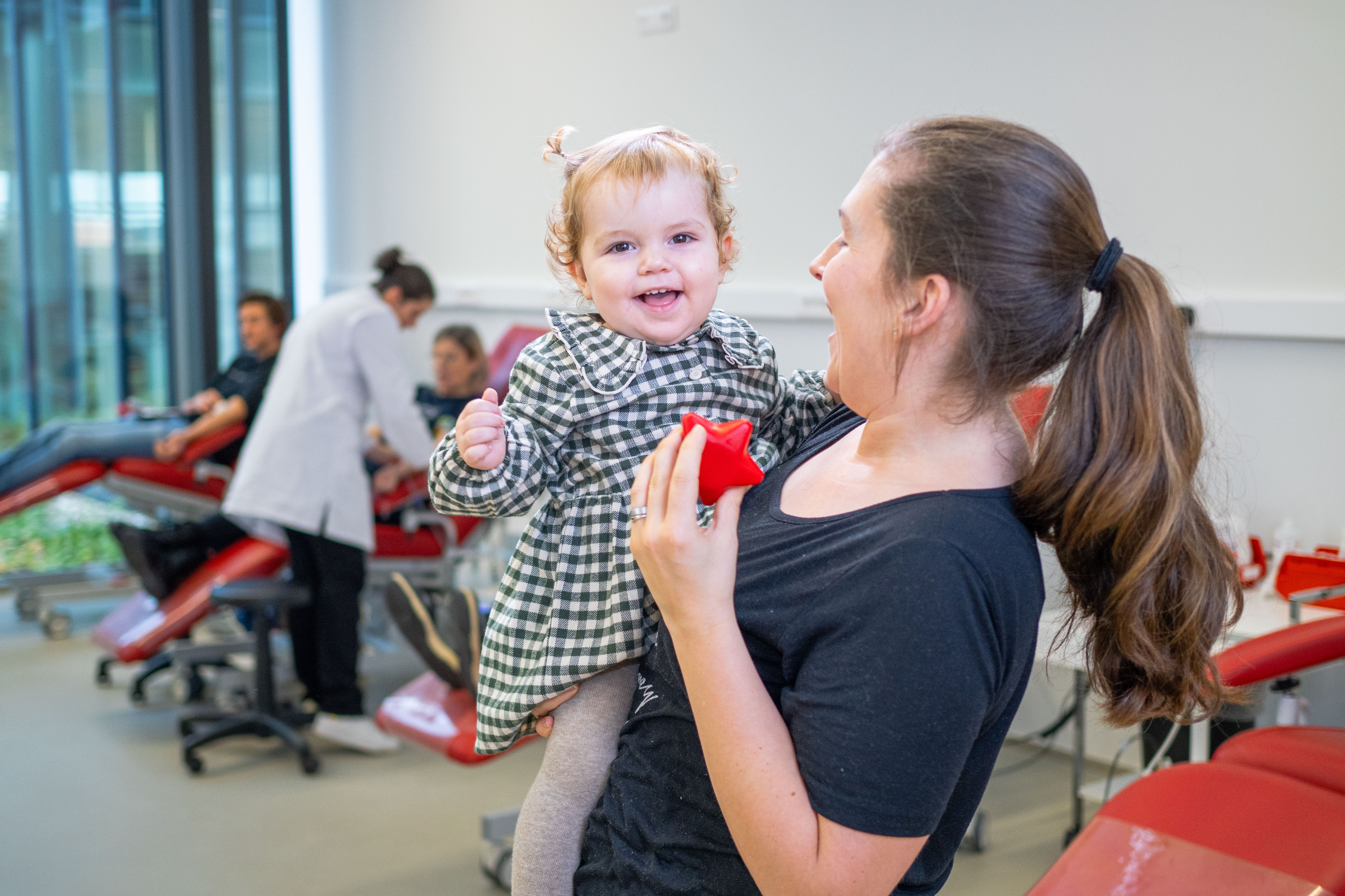
"Renée is doing great" Hanne tells us smiling during the conversation that continues right after the photo shoot. But behind her smile is a struggle she is eager to tell us about. Because it is such an important part of her life, and defines that of her family. A struggle in which blood transfusions are essential to Renée's life.
Hanne and her husband Bruno had long known Belgian Red Cross-Flanders 's mission to provide safe and sufficient blood, plasma and platelets. After all, Bruno has been donating plasma for years, it's a sort of hobby with a regular clique of friends. For a good year now, they have found themselves on the other side of the story, as recipients.
"Renée needs blood transfusions because her red blood cells break down too quickly, causing her hemoglobin to drop" explains Hanne. "These transfusions are vital for Renée and their rhythm and frequency change as she grows. Until she was 6 months, she had to go to the hospital for transfusions every 3 to 4 weeks. Meanwhile, there may already be 7 weeks between 2 treatments. It is an intense process, the transfusions take up to 4 hours. Fortunately, the hospital in Bruges has become a kind of second home and we receive not only care, but also support and love from a dedicated team there."
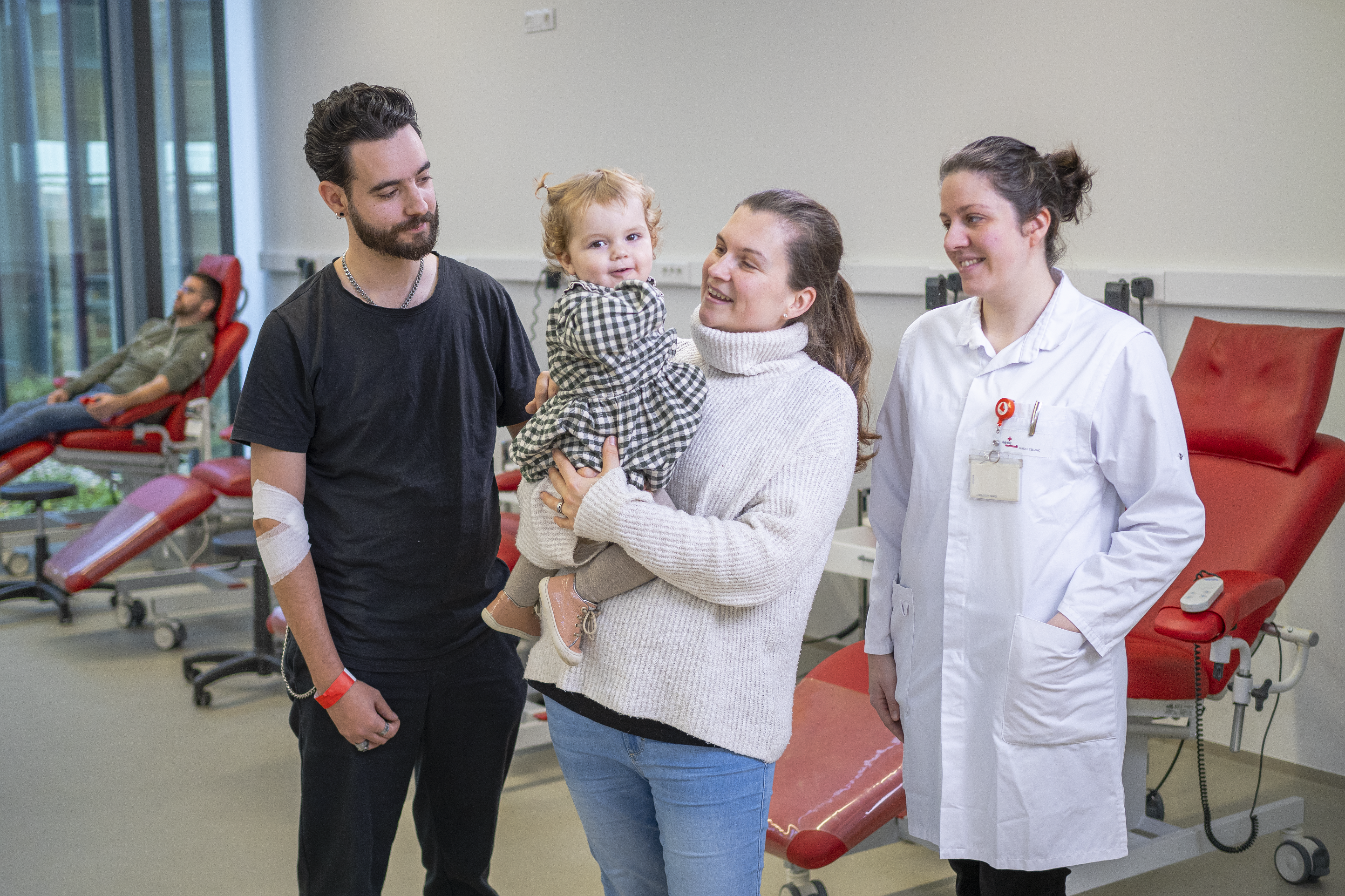
Hanne emphasizes, "Renée's smile remains unchanged. Transfusions are her only option; there are no pills or alternatives for PKD. But thanks to donor blood, she can simply keep living. If this had not been possible a few years ago, she might not be here now. So I am enormously grateful to science and to the donors of Belgian Red Cross-Flanders. Thanks to them, Renée can remain her happy self".
The message Hanne wants to give is simple but clear: every donor can change lives and offer hope. Renée's story symbolizes the inestimable value of voluntary donorship and every donation that comes from it.
Thanks for giving for Renée!
Give for Elijah
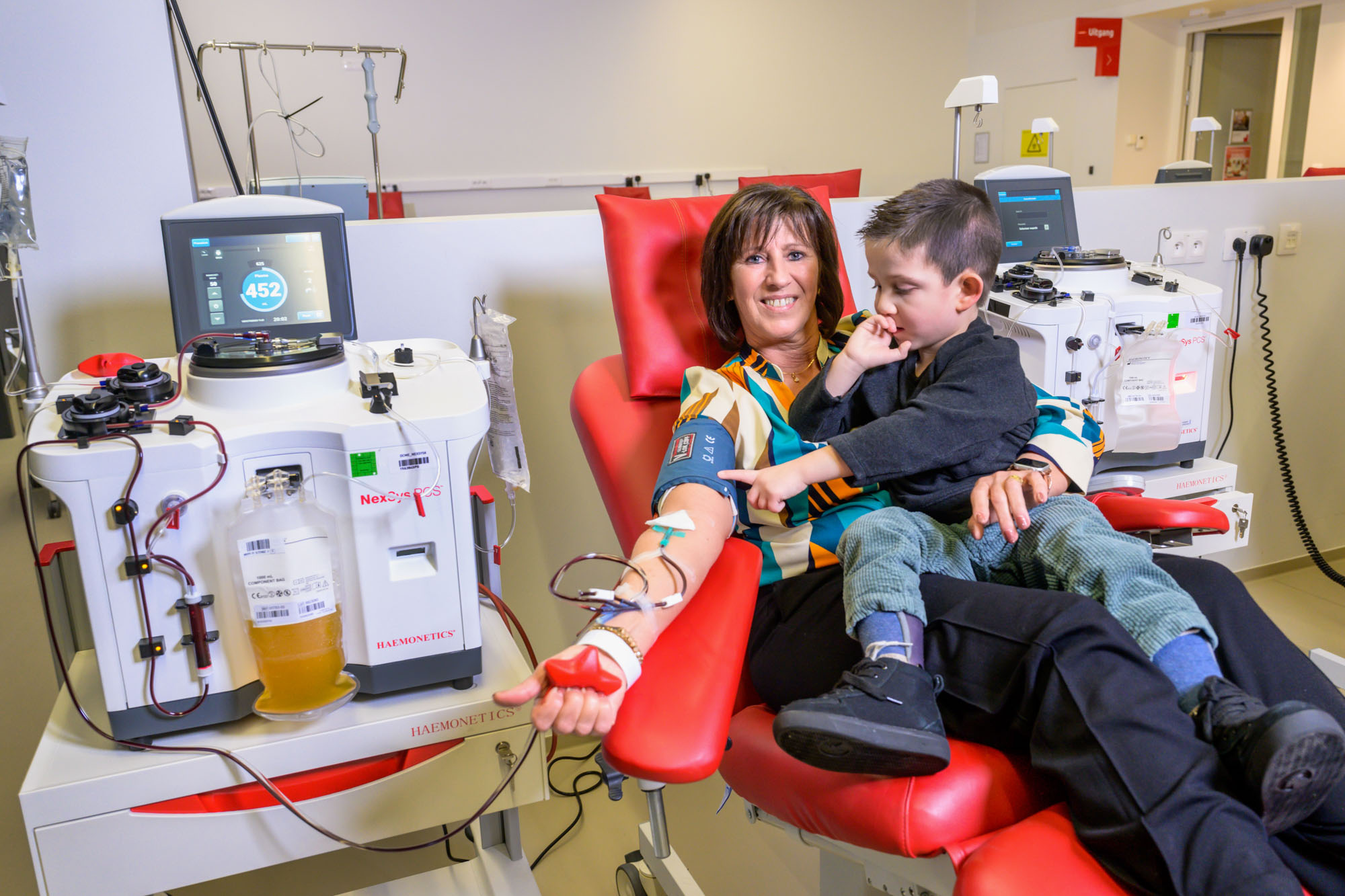
Yana also shares the story of her infant son Elijah in an emotional interview. It begins in 2018 when Elia was born. "Elia was very sick from the beginning," Yana says as she looks back on his first few months. "A severe lung infection forced him to spend four weeks in neonatology after birth."
And unfortunately, it didn't stop there. Every time he seemed to recover, another hospitalization followed. "It was a roller coaster of worries and illnesses," Yana adds. "When he was about 7 months, Elia got so sick that he spent six weeks in the hospital, including two weeks in intensive care. We almost lost him."
"That was when the doctors took blood several times and did more extensive tests," Yana says. These showed that Elia was producing little to no white blood cells of his own, making him more susceptible to infections. Professor Haerynck, a leading pediatric immunologist, indicated that there was a 60% chance Elia would need a stem cell transplant, with an uncertain chance of success.
"We were in shock, he was still so small," recalls Yana. When it turned out that Elijah's 3-year-old sister would probably be the best donor, the family was completely bewildered. However, as an alternative, it was suggested to try immunoglobulins from plasma.
"It was a leap of faith," says Yana. But despite all the uncertainty, the treatment had a positive effect. "Elia got sick less often and had more resistance. As a result, the stem cell transplant is off the agenda, or at least so long as Elia's body continues to respond well to the administration of immunoglobulins."
"The immunoglobulins are made from plasma. So for us and especially for Elia, it is very important to have a sufficient supply. In the beginning they were administered every 4 weeks in the hospital but after a few months we were able to switch to weekly treatment at home. For this we learned the necessary actions ourselves and now every week on 'prick day' I administer Elia his medication." explains Yana. "He still gets sick, but it's not as alarming as before." It is a relief not to have to constantly go to the hospital anymore and to finally be able to take care of their little boy at home.
"Plasma donations are very important to us. After all, without plasma donations there is no medication for Elia. So we are very grateful for the people around us, such as Grandma Yvette, and all the others, who donate plasma on a regular and voluntary basis at Belgian Red Cross-Flanders. It's not only for Elia, but also for many others," Yana stresses, while underlining the invaluable value of plasma donations. "You save lives with it and save us a lot of visits to the hospital."
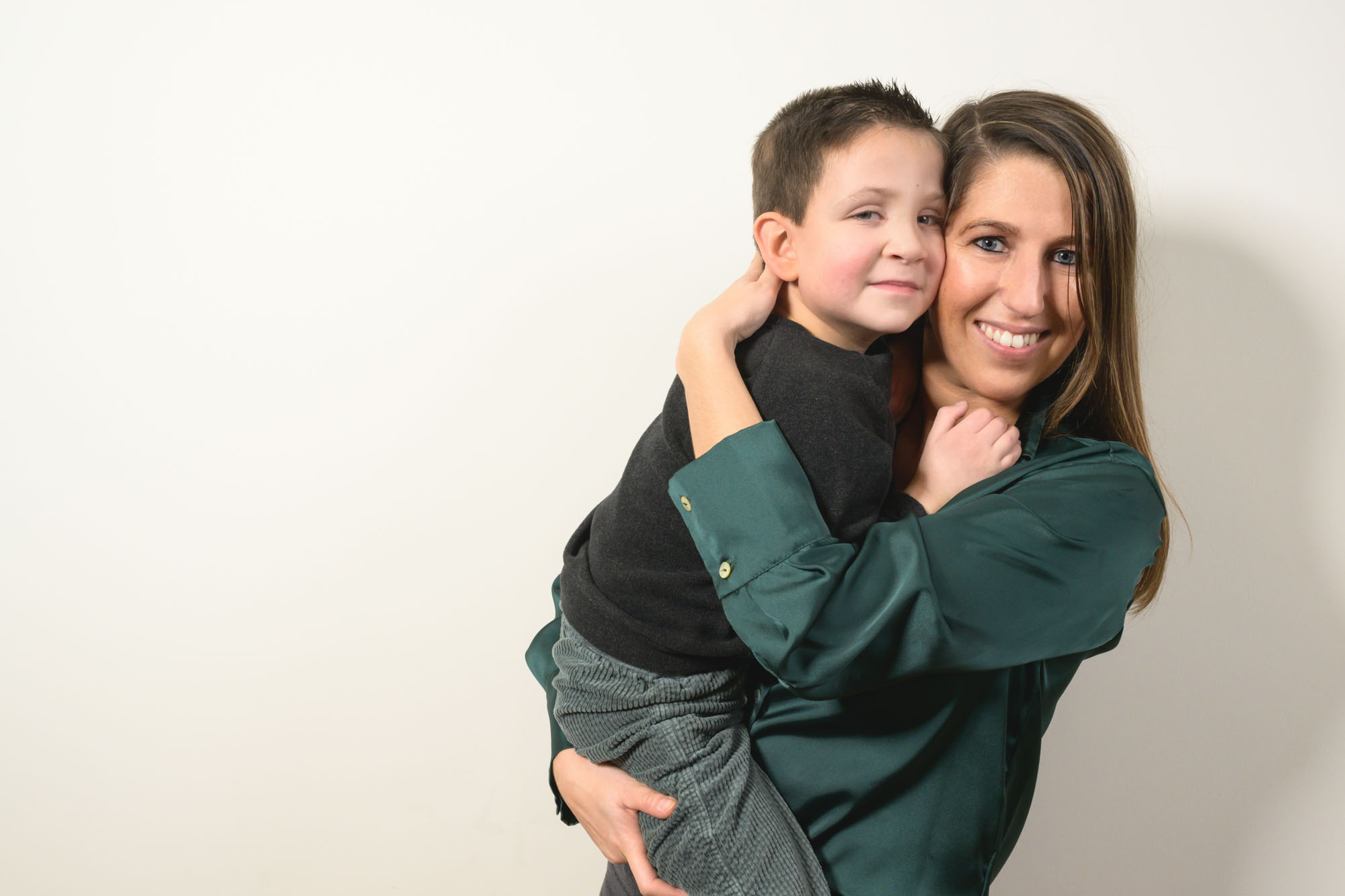
Thanks for giving for Elijah!
Give for Lucy and Mila
Lucy (9) and Mila (11) both have PID, short for Primary Immune Deficiency. Most children with PID are unable to make enough antibodies on their own, which compromises their immune system. The result is persistent infections of the respiratory tract, intestines or skin, for example. Thus, they become sicker more often than others.
What are antibodies?
Antibodies, also called immunoglobulins, are proteins produced by your immune system in response to the presence of foreign substances, such as bacteria or viruses. They play a crucial role in protecting the body from pathogens.
Did you know that plasma also contains antibodies?
Therefore, plasma donations are vital for people with immune disorders.
"So in a plasma donation, the plasma is separated from the red blood cells in your blood. After this, the red blood cells are returned. From the plasma, life-saving medications are processed, for patients with Primary Immune Deficiency, among others. A baby with PID, like Lucy and Mila, needs 80 plasma donations for a year's treatment." explains Professor Haerynck.
"Thank you for donating plasma for us. This will help us get less sick and go to parties and school like other kids." - Lucy and Mila
Give for Milan
Evi is the devoted mom of three beautiful children: Milan (9), Lina (6) and Mauro (5). Her little sons both suffer from the same metabolic disease, and Milan also has an autoimmune disease on top of that, requiring plasma to survive.
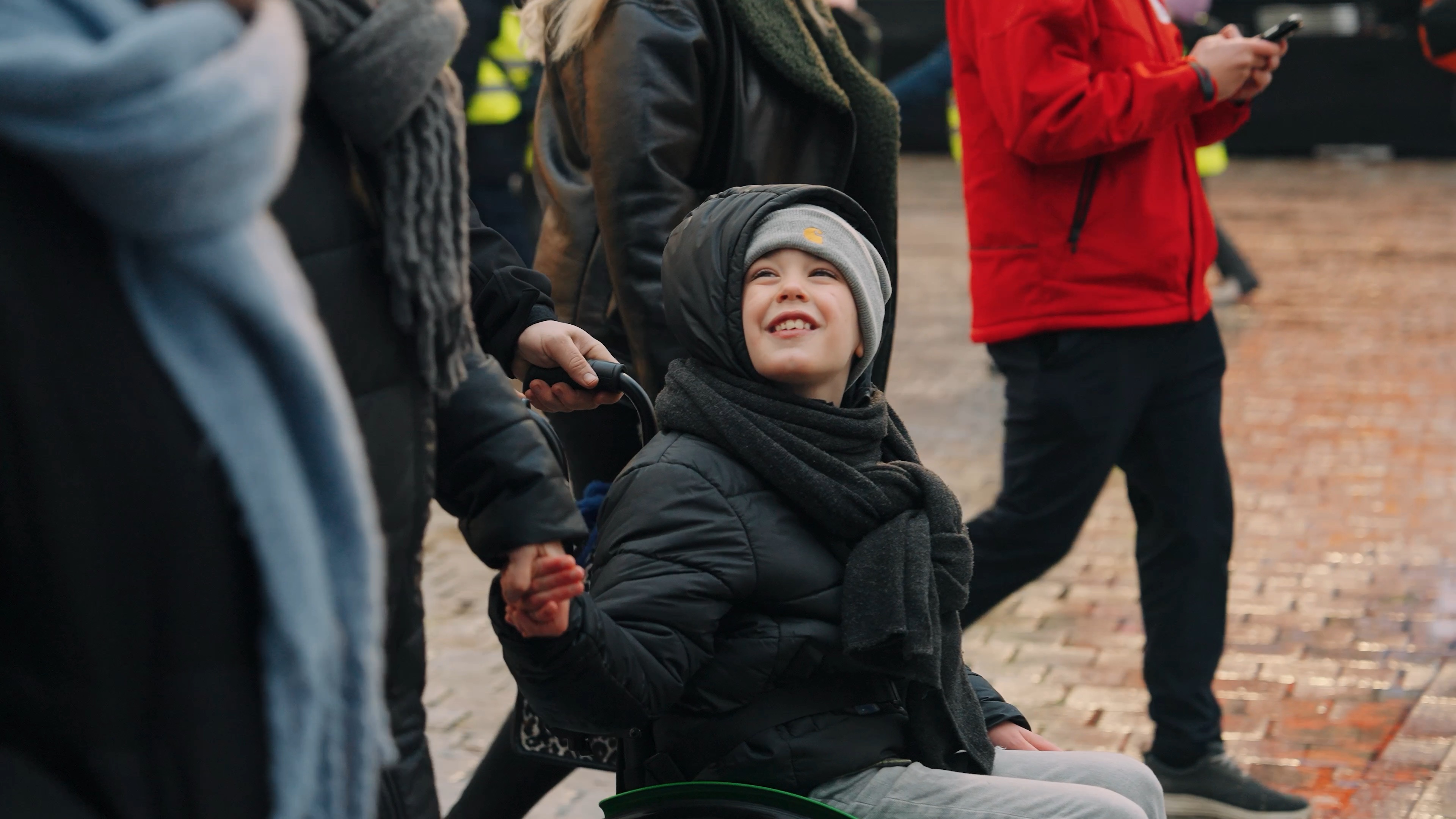
During Warmest Week, Evi shared her heartbreaking story with Sam De Bruyn. For Milan depends on plasma to stay healthy and alive. Without the vital plasma medication, even a simple flu can be fatal for him. That is why Evi made an urgent appeal in The Warmest House: "Milan cannot live without plasma. If he doesn't get it, even a simple cold can be fatal to him. So it is of enormous importance that people donate plasma," she testified at the microphone to Sam De Bruyn. "Thank you for donating plasma.Thereis no alternative so thanks to you, Milan can live a more normal life."
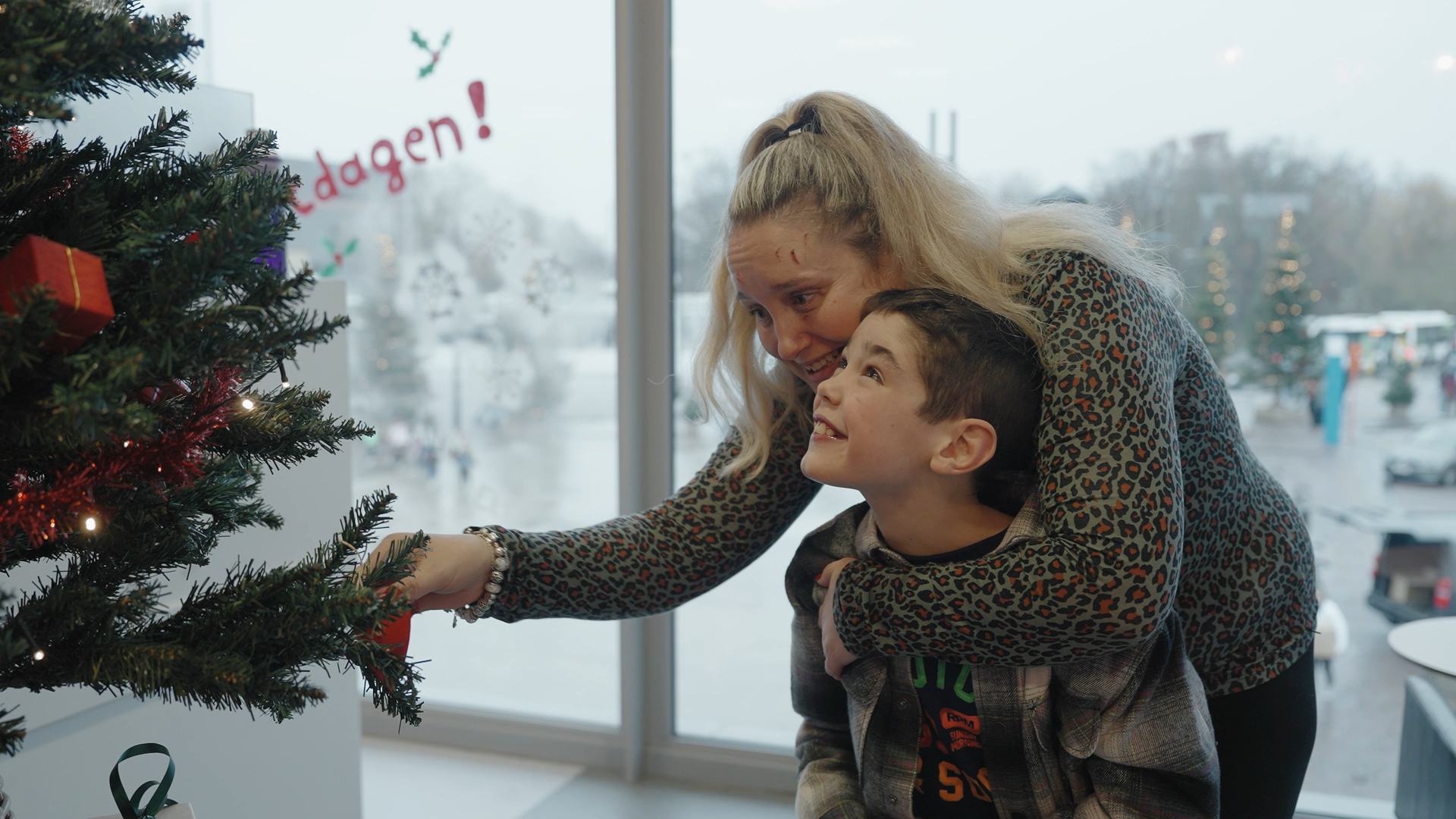
Thanks for giving for Milan!
Give for Tom
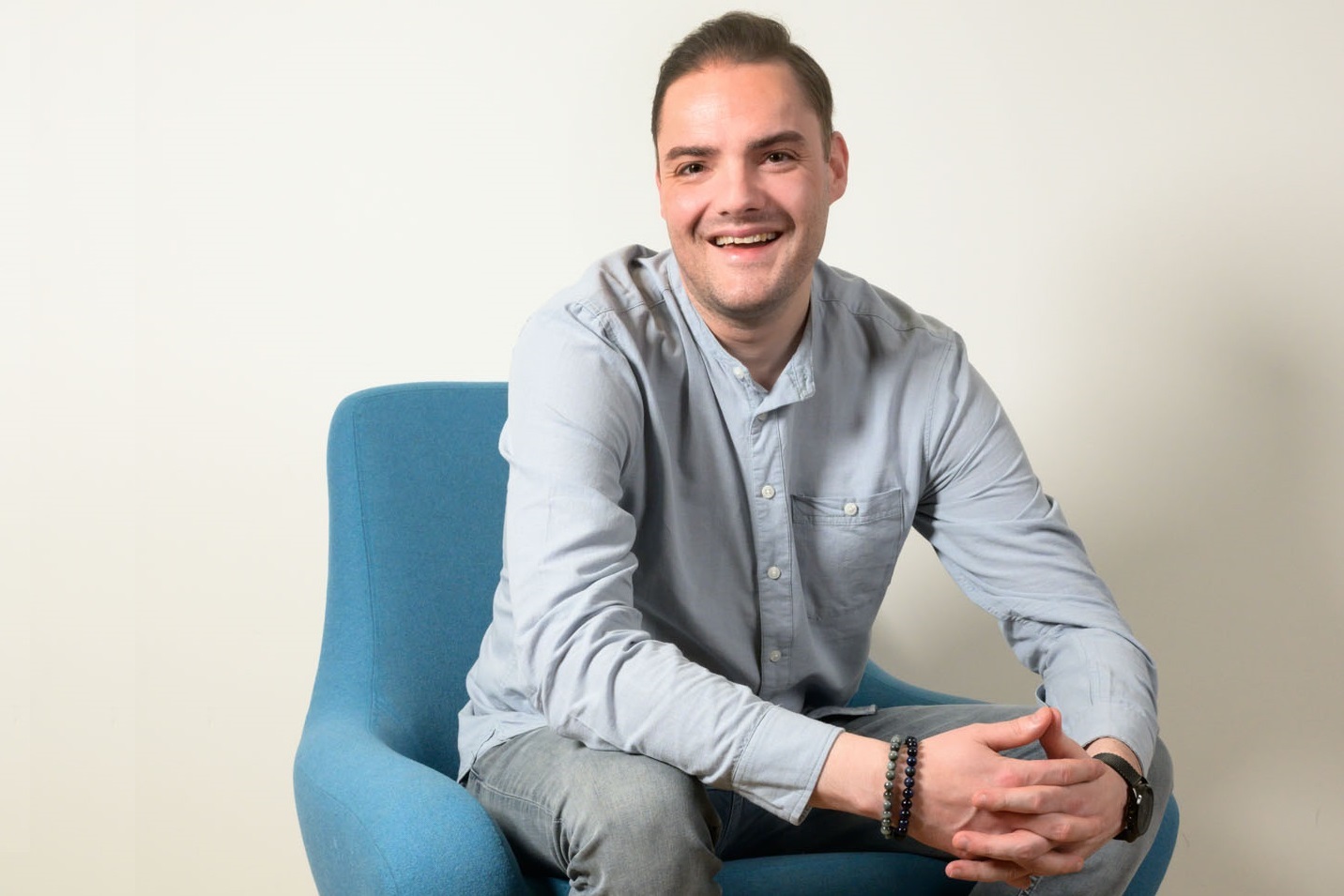
Tom is a thirty-something who brings his story for the second time to Belgian Red Cross-Flanders. He was a donor himself, but then fate struck. He says, "Even though it was about nine years ago, I remember it like it was yesterday. What started with balance disorders and decreased motor function in my left hand during the first months of 2015 quickly escalated. Weeks passed and I faced constant headaches, fatigue and vomiting. I stayed home for several weeks but things did not improve and eventually my body gave signals that could not be ignored."
A visit to a nose-throat ear specialist led to a series of tests. The results were alarming, and soon Tom found himself in the hospital for an urgent MRI scan. "The verdict was harsh: a medulloblastoma, a malignant brain tumor that was putting pressure on my brain," he said. Fortunately, surgery was possible. The surgery to remove the tumor took 10 hours and I ended up in a coma. I was in intensive care for four weeks."
This was followed by countless radiation treatments and months of chemotherapy. "During chemotherapy, my blood levels were extremely low and my body was exhausted. Blood transfusions were the only way to recover and I was given a total of 12 units of blood. They got me back on my feet, literally."
Still, the trials were not over, and living a normal life proved challenging. Tom continues his story, "I had impaired motor skills and balance disorders and attended hours of physical and occupational therapy. But I recovered, was able to live on my own and after a while love was around the corner. My girlfriend and I wanted children, but after my treatments this seemed like an unattainable dream."
However, the medical world offered a new opportunity: fertility testing and a pathway through ICSI. An emotional journey that resulted in the message "Congratulations, you are pregnant!". And so in October 2023, Tom and Eline welcomed a beautiful daughter, Aurelie. An unexpected gift after all he had endured.
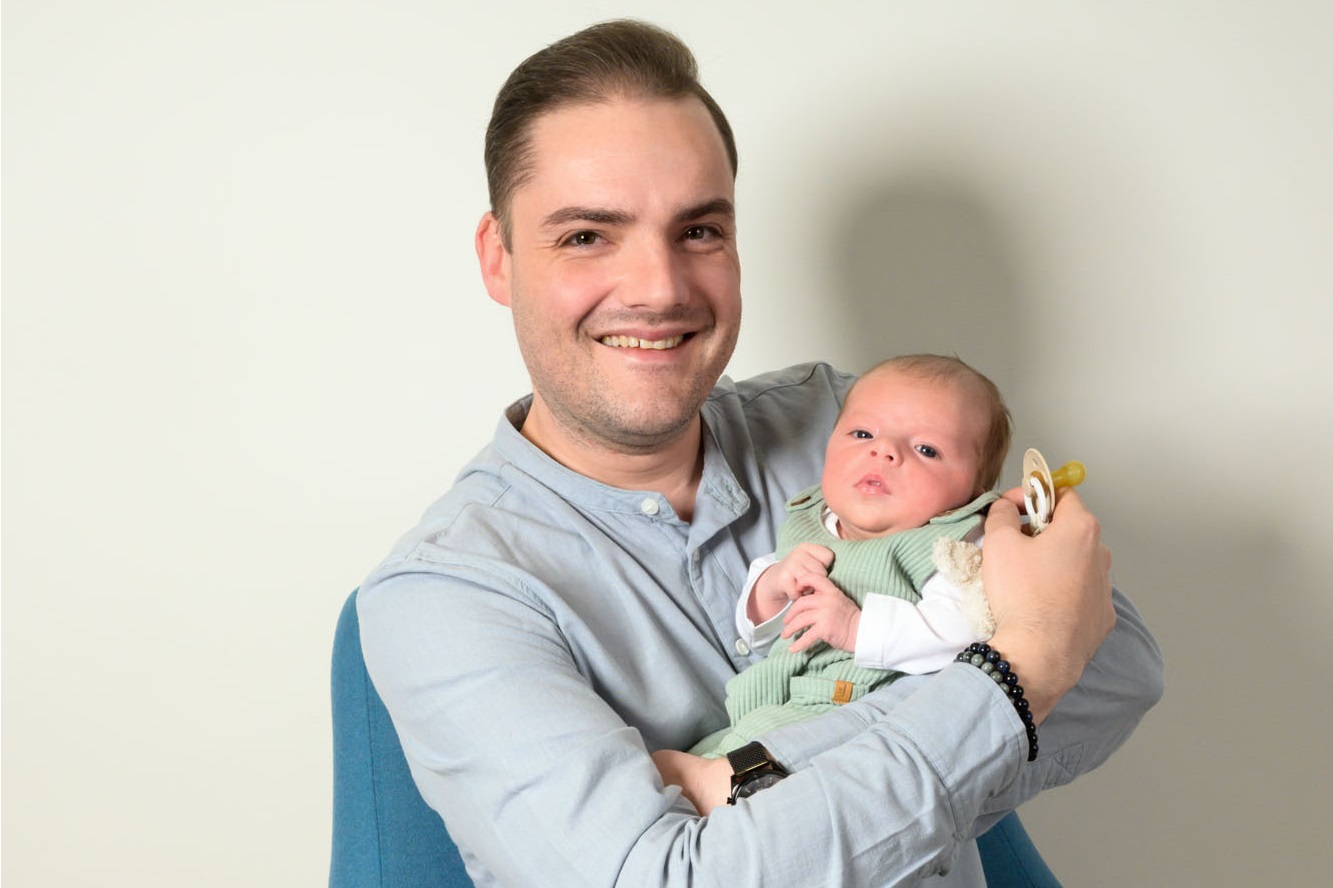
To the donors who gave their blood, Tom likes to say,"Thank you for giving blood for me. Thanks to your donations, I not only got a second chance at life, but also the chance to meet the woman of my life and have a beautiful daughter together."


